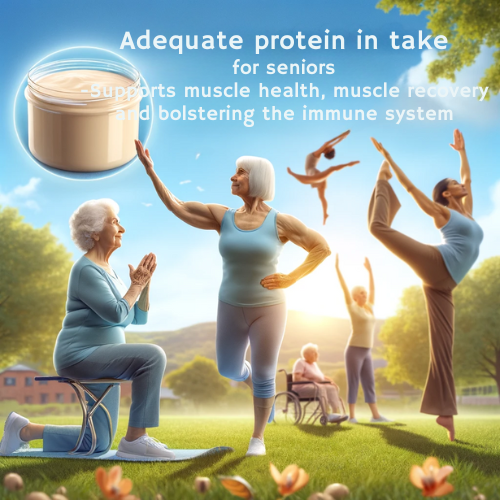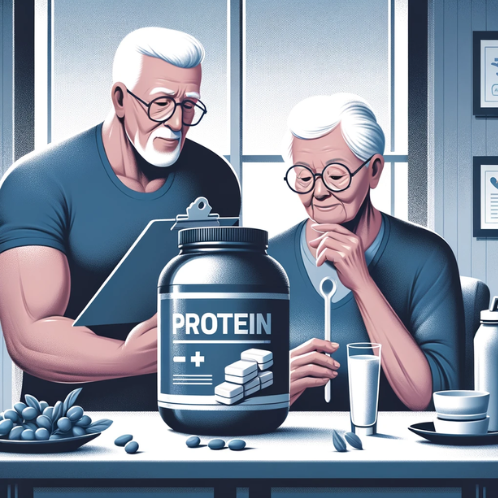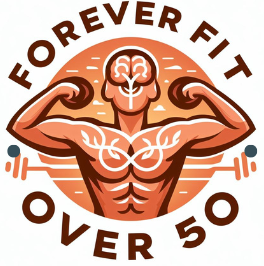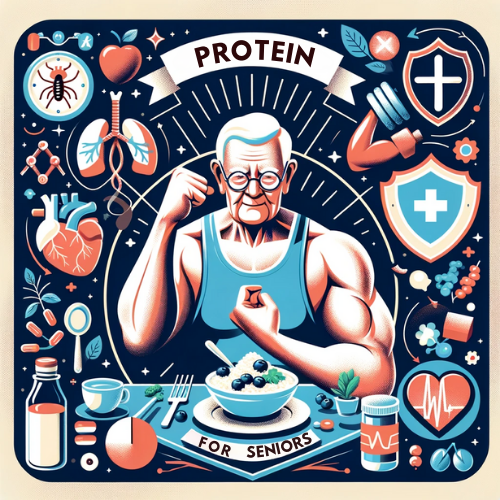In today’s aging society, understanding the pivotal role of protein intake for seniors has never been more crucial. As individuals transition into their golden years, maintaining muscle mass, strength, and overall nutritional health becomes a significant concern. This comprehensive guide delves into the essence of protein’s impact on senior health, spotlighting the augmented necessity for protein with advancing age, the ramifications of protein deficiency, and the many ways protein helps seniors stay healthy.

The Crucial Role of Protein in Elderly Health
Essential Nutrients for Aging Muscles
Protein is the building block of muscle tissue, facilitating repair, growth, and the maintenance of muscle mass, which tends to decline with age. This age-related muscle loss, or sarcopenia, significantly impacts seniors’ strength, stamina, and mobility. Adequate protein intake helps counteract these effects, preserving muscle health and ensuring seniors maintain their functional abilities.
Why Seniors Need More Protein
Research indicates that the aging body processes protein less efficiently, necessitating an increased intake to achieve the same muscle synthesis as younger individuals. This elevated need is also crucial for supporting the body’s repair mechanisms, contributing to seniors’ recovery from illnesses or injuries, and maintaining a robust immune system.
Key to Nutritional Wellness in Old Age
Protein’s role extends beyond muscle maintenance, influencing various aspects of senior health. It supports bone density, skin health, and the production of enzymes and hormones, making it a cornerstone of a balanced diet for the elderly. Ensuring a sufficient protein intake is thus paramount for holistic health and wellness in later life.
Combatting Protein Deficiency Risks
A deficiency in protein intake can lead to a myriad of health issues for seniors, including increased risk of chronic diseases, impaired wound healing, and a decline in overall health status. Recognizing and addressing protein needs are critical steps in preventing these potential complications and enhancing life quality for the elderly.

Benefits of Adequate Protein Intake for Seniors
Sarcopenia Prevention and Muscle Maintenance
As individuals age, they face a natural decline in muscle mass and strength, a condition known as sarcopenia. This process can lead to weakened physical function, increased risk of falls, and a general decline in quality of life. However, research has shown that higher protein consumption can mitigate the effects of sarcopenia by providing the essential amino acids needed for muscle protein synthesis. For seniors aiming to maintain muscle mass, strength, and functionality, integrating protein-rich foods such as lean meats, dairy products, legumes, and nuts into their diets is crucial.
Boosting Senior Mobility and Fall Prevention
Mobility is a key component of independence for seniors, with protein playing a significant role in maintaining muscle strength and balance. Adequate protein intake supports not only muscle health but also contributes to bone density, both of which are vital for preventing falls—a common cause of disability among older adults. By ensuring a diet sufficient in high-quality protein, seniors can enhance their mobility and reduce the risk of fall-related injuries.
Strengthening Immune Function
The immune system naturally weakens with age, making older adults more susceptible to infections and illnesses. Protein, particularly its constituent amino acids, is essential for the production of antibodies and immune system cells. A diet rich in protein can bolster the immune response, providing seniors with a better defense against common pathogens and quicker recovery when ill.
Promoting Efficient Wound Healing
For seniors, the healing process after injury or surgery can be prolonged due to reduced skin elasticity and slower cell regeneration. Protein plays a vital role in wound healing by supporting the growth of new tissue and repairing damaged cells. Seniors recovering from wounds or surgical procedures may benefit from increased protein intake to accelerate the healing process and reduce the risk of infection.

Protein Supplements: Enhancing Senior Diets
Identifying the Need for Supplements
While whole foods are the best source of nutrients, certain factors like reduced appetite, dietary restrictions, or increased nutritional needs can make it challenging for some seniors to consume enough protein through diet alone. In these cases, protein supplements can be an invaluable tool, offering a convenient and efficient way to ensure adequate protein intake.
Navigating Protein Supplement Options
The market offers a variety of protein supplements, each with its own set of benefits. Whey protein is renowned for its high biological value and rapid absorption, making it ideal for post-exercise recovery. Casein protein, on the other hand, is digested more slowly, providing a sustained release of amino acids. Plant-based options like soy and pea protein offer alternatives for those with dietary restrictions or preferences. Seniors should consider their individual health needs, preferences, and any advice from healthcare professionals when choosing a protein supplement.
Incorporating Supplements into Senior Diets
Protein supplements can easily be added to seniors’ diets in various forms, such as shakes, bars, or powders that can be mixed into foods. For those with difficulty swallowing or chewing, liquid supplements provide a palatable alternative. It’s important for seniors and their caregivers to find creative and enjoyable ways to incorporate these supplements, ensuring both nutritional needs and taste preferences are met.
Dispelling Myths About Protein Supplementation
Concerns about kidney function and bone health often accompany discussions on protein supplementation for seniors. However, research indicates that, for individuals with healthy kidneys, a higher protein intake does not cause harm. Moreover, adequate protein is essential for bone health. Seniors and caregivers should rely on evidence-based information and consult healthcare professionals to make informed decisions about protein supplementation.

Informed Choices on Protein Consumption for Seniors
Consulting with Healthcare Professionals
Navigating protein needs can be complex, particularly for seniors with chronic conditions or specific dietary requirements. Consulting healthcare providers or dietitians ensures personalized advice, tailoring protein intake recommendations to individual health profiles and dietary preferences.
Understanding Protein Supplement Labels
For seniors incorporating protein supplements into their diet, deciphering product labels is crucial. Key factors include the type of protein, the amount per serving, and the presence of additional nutrients or additives. Opting for high-quality, reputable brands that meet safety and nutritional standards is essential for maximizing health benefits.
Balancing Protein Intake from Foods and Supplements
While supplements can help meet protein needs, whole foods should remain the primary protein source. Seniors are encouraged to consume a varied diet rich in lean meats, dairy products, legumes, and nuts. Supplements can fill nutritional gaps or serve as a convenient option when whole food consumption is challenging.
Maintaining a Holistic Approach to Senior Nutrition and Wellbeing
Effective protein consumption is part of a broader strategy for senior health, which includes regular physical activity, hydration, and mental health care. A holistic approach ensures that dietary changes, such as increased protein intake, are integrated into a comprehensive lifestyle that promotes overall well-being.
Conclusion:
The importance of protein in elderly health cannot be overstated, with its myriad roles in maintaining muscle mass, supporting recovery, and bolstering immune function. As seniors navigate their nutritional needs, making informed choices about protein intake—guided by professional advice and a focus on quality—becomes crucial. By understanding and addressing these needs, seniors can enhance their health, maintain independence, and enjoy a vibrant quality of life in their later years.
Check out our Article on Heart Healthy Recipes For Seniors.
Here’s a little transparency: Our website contains affiliate links. This means we may receive a small commission if you click and make a purchase. Don’t worry, there’s no extra cost to you. It’s a simple way for you to support our mission of bringing you quality content.


Protein is an important component of the daily diet. It is essential for building muscles and maintaining bone density. Although it is crucial during all stages of growing and developing, it becomes even more important as we grow older.
As we mature in age, our bodies don’t always absorb protein as efficiently as during our youth, so eating enough protein becomes more important with age. What is the recommended daily protein requirement for a woman in her mid sixties? Do women need more than men, or is the requirement similar for both sexes? Thank you.
Thank you so much for your insightful comment, LineCowley! You’ve beautifully highlighted the crucial role of protein in our diets, especially as we age. It’s indeed true that our bodies face challenges in absorbing protein efficiently with advancing years, making it even more essential to ensure we’re meeting our daily protein needs.
Regarding your question about the recommended daily protein requirement for a woman in her mid-sixties, it’s generally advised that older adults consume about 1.0 to 1.2 grams of protein per kilogram of body weight per day. This recommendation aims to support optimal health, muscle maintenance, and overall functionality.
As for the difference between men and women, the protein requirement is largely similar when adjusted for body weight. However, individual needs can vary based on factors like activity level, health status, and specific nutritional goals. It’s always a good idea to consult with a healthcare provider or a dietitian to personalize dietary plans based on individual needs and circumstances.
I hope this helps, and if you have any more questions or need further clarification, please don’t hesitate to ask. Your journey to maintaining a healthy and active lifestyle is inspiring, and ensuring you’re getting enough protein is a fantastic step in that direction!
Hi Gary,
Your article is quite interesting. As you cover, the significance of protein for older adults highlights how it helps us maintain our general health, strength, and muscle mass. This viewpoint raises important queries regarding the dietary requirements of the elderly: If seniors have reduced appetites or nutritional restrictions, how can they ensure they are getting enough protein? What are the best ways for seniors to include high-quality protein in their diets to support their health and mobility, considering the variety of protein sources available?
Hi Sara,
Thank you for your thoughtful comment and engaging questions. It’s indeed crucial for seniors to focus on incorporating high-quality protein into their diets, especially when facing challenges like reduced appetites or dietary restrictions.
For those with smaller appetites or specific dietary needs, incorporating protein powders like the BioTrust’s “Ageless Multi-Collagen Protein Powder”can be an excellent way to ensure adequate protein intake without having to consume large quantities of food. These powders can be mixed into smoothies, oatmeal, soups, and even certain baked goods, making it easier to meet protein needs in a versatile and digestible form.
Additionally, other high-quality protein sources include lean meats, fish, eggs, dairy products like yogurt and cottage cheese, and plant-based options such as beans, lentils, and tofu. Including a variety of these foods in your diet can help cover different nutritional profiles and support overall health and mobility.
Remember, the key is to find protein sources that you enjoy and that fit into your lifestyle, making it easier to maintain a balanced diet. If you’re unsure where to start or how to adjust your diet to meet your protein needs, consulting a nutritionist can provide personalized guidance.
Your interest in staying informed and proactive about your health is inspiring, Sara. Keep exploring and finding what works best for your body and lifestyle.
Warmly,
Gary